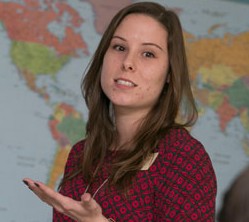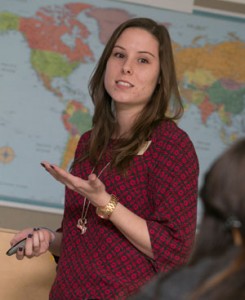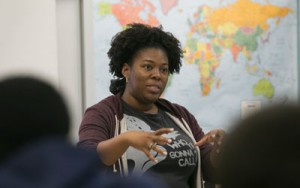from “Unplugged” Course Spotlights Scientists While Enlightening High School Students by Brian Smith on SBU Happenings
A scientist doesn’t have to wear a white labcoat to be taken seriously, let alone inspire a generation of young minds — just ask the students at East Islip High School.
In mid-April, even on the verge of finals, college entrance exams, prom, graduation and summer vacation, the upperclassmen studying science at East Islip gave their full attention, and then some, to two visitors presenting their scientific research and passion.
Jinelle Wint and Danica Warns are two of many who experienced Science Unplugged, a unique course offered through theAlan Alda Center for Communicating Science at Stony Brook University that provides graduate student-scientists opportunities to hone their communication skills while encouraging teenagers on Long Island and around the world to study science.
“You can’t be a scientist without being enthusiastic about it — you love it, it excites you, and when you communicate that to young people directly, they can catch that contagious enthusiasm,” said acclaimed actor, science advocate, and visiting professor Alan Alda. “We not only inform young people, we’re going to turn them into scientists.”
If you ask Jinelle about scientific attire, she might suggest jeans, sneakers and a Ghostbusters tee. That’s what the doctoral student researcher wore in front of classroom audiences while sharing her worm-based research on stopping the spread of cancer. But clothes aren’t the only factor when trying to reach a group of teens.
“I like that in Science Unplugged, we learn to insert lots of questions in our presentations. You need that to bring the audience back into your talk,” said Jinelle. “Audiences, especially in high schools, tend to lose interest quickly. If you get them engaged, presenting is a lot more effective.”
Science Unplugged-Jinelle Wint from Alan Alda Center on Vimeo.
When Jinelle asked a class of 10th and 11th graders in East Islip’s Medical and Health Technology Career Academy an open-ended, personal question about the tough topic, hands shot up. One student shared that his grandfather suffered from pancreatic cancer, another told of her aunt’s battle with breast cancer, and a third asked why surgery is difficult in cases of small cell carcinoma — for her mom’s sake.
Reaching students is important to Jinelle, and after an intro like that, it was easy for her to keep the class engaged.
“I really appreciate science outreach and plan to incorporate it in my goal of becoming a professor who really reaches the students, not just lectures at them,” said Jinelle. “I’m taking the steps early to prepare myself.”
Science Unplugged is an important step for Danica, too. She earned her bachelor’s in Marine Sciences at Stony Brook in 2012, studying in the lab and aboard research boats. But after volunteering at the Long Island Aquarium, Danica found her calling in communication and decided to pursue a master’s in Marine Conservation and Policy.
“I feel good. I’m still shaking, feeling nervous, but I think it was good,” Danica said after presenting for the first time to an East Islip AP Environmental Science class. “I’ve taken a few Communicating Science classes at Stony Brook and they really helped. Before last semester, I don’t think it would’ve gone as well.”
Danica’s presentation, titled “A Delicate Balance,” makes viewers aware that every organism has an important role in our ecosystems. It’s a crucial lesson when supporting marine conservation in the face of our ocean’s “Silent Collapse,” or the gradual loss of sea life due to problems like overfishing, bycatch and oil spills.
Science Unplugged-Danica Warns from Alan Alda Center on Vimeo.
Alex Russo, a senior in East Islip’s Environmental Science Career Academy and president of the school’s Environmental Club, was thrilled to attend Danica’s presentation, but also to learn about Science Unplugged.
“Going into environmental science, I really want to change the world. I want to bring awareness to issues like this and see a real change,” said Alex, who hosts beach cleanups and community awareness events in his club leadership role. “It looks like studying in the Alda Center really paid off for Danica; she looked very comfortable in front of the class. I’m interested in teaching, so I’ll definitely look into Science Unplugged at Stony Brook.”
Teacher Lauren Ferlin conducts that AP science class, and helped coordinate the Science Unplugged visit to East Islip.
“Science Unplugged gives high school students an opportunity to see how our class topics are actually investigated at a college research level, making the information we discuss more relevant and realistic,” said Ferlin. “It’s not just out of a textbook, but from someone with first-hand experience in the field, which I think brings a different aspect to our students’ learning that really clicks with them.”
East Islip isn’t the only high school that benefits from Science Unplugged. Several others on Long Island like Miller Place, Patchogue-Medford and Central Islip host the presentations, serving a diversity of local high school students science outreach efforts, while providing Stony Brook students a variety of audiences and atmospheres to practice with.
Peter Chahales, a fifth-year doctoral candidate in Molecular Genetics and Microbiology, was one of the first Stony Brook students to present through Science Unplugged in 2013 — to what he called a disorderly classroom. Just like those high school students, potential employers appreciate Peter’s science outreach efforts as well.
“I thought this was going to be tough, especially holding the students’ attention, but they were totally into my presentation,” said Peter. “By the end, students I expected to be problematic were the ones with the most questions and interest in my work. I saw the sudden impact of what I’m doing and how I’m sharing it. Every student shook my hand when class ended.”
“When applying for jobs, I definitely list Science Unplugged presentations on my resume,” said Peter. “The companies I’ve been looking at pride themselves in their science outreach programs. This experience helps me stand out during the application process.”
Giving graduate science students real-world practice presenting their work is the primary goal, said Science Unplugged Coordinator and Alda Center Improvisation Director Valeri Lantz-Gefroh.
“The happy byproduct of that goal is community outreach; some high school students will never meet another scientist,” said Lantz-Gefroh. “It’s really important for high schoolers to meet scientists, and the fact that these scientists are students makes them more approachable.”
Lantz-Gefroh, a theatre actor, director and playwright for 25 years, formerly served as Director of Acting for Stony Brook’s Department of Theatre Arts. Her shift to Communicating Science shows the influence stage performance skills can have on science outreach.
“Science Unplugged isn’t just about learning the skills and hoping for the best, but about putting those skills into a practical application,” said Lantz-Gefroh. “One student told me this was the most important class she took in grad school.”
Such appreciation isn’t uncommon. Kim Bell earned her bachelor’s in Psychology from Stony Brook in 2003, then returned to become a doctoral candidate in Genetics and joined a Science Unplugged class — but science wasn’t her first focus.
“A long time ago I loved acting and took the lead role in some plays, but in high school I focused more on academics and science,” said Kim. “It’s cool to get back into something I liked when I was younger. During high school I became terrible at public speaking, but Science Unplugged opened me up again.”
Lyl Tomlinson, a doctoral candidate in Neuroscience, presented with Science Unplugged at local high schools as well as the Osher Lifelong Learning Institute (OLLI), and finds the experience energizing.
“Science Unplugged makes me excited to get back in the lab,” said Lyl. “When I go to high schools or the OLLI and see people interested in the work I’m doing, it invigorates me — this is why I’m here, this is why I play with mice all day, this is why I’m trying to figure out how the brain works. My work is relevant to people and it can really help them.”
Since Stony Brook scientists’ work is relevant to audiences beyond the Long Island community, Science Unplugged presentations are available in full on Vimeo and planning is underway to offer live presentations via Skype to other schools worldwide. But for now, the show must go on, and local high school classes are the stage for our scientists.






